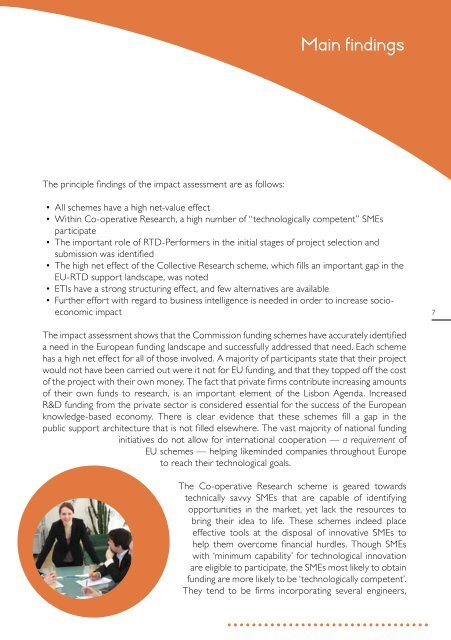SMEs and Research - European Commission - Europa
SMEs and Research - European Commission - Europa
SMEs and Research - European Commission - Europa
Create successful ePaper yourself
Turn your PDF publications into a flip-book with our unique Google optimized e-Paper software.
The principle findings of the impact assessment are as follows:<br />
•<br />
•<br />
•<br />
•<br />
•<br />
•<br />
Main findings<br />
All schemes have a high net-value effect<br />
Within Co-operative <strong>Research</strong>, a high number of “technologically competent” <strong>SMEs</strong><br />
participate<br />
The important role of RTD-Performers in the initial stages of project selection <strong>and</strong><br />
submission was identified<br />
The high net effect of the Collective <strong>Research</strong> scheme, which fills an important gap in the<br />
EU-RTD support l<strong>and</strong>scape, was noted<br />
ETIs have a strong structuring effect, <strong>and</strong> few alternatives are available<br />
Further effort with regard to business intelligence is needed in order to increase socioeconomic<br />
impact<br />
The impact assessment shows that the <strong>Commission</strong> funding schemes have accurately identified<br />
a need in the <strong>European</strong> funding l<strong>and</strong>scape <strong>and</strong> successfully addressed that need. Each scheme<br />
has a high net effect for all of those involved. A majority of participants state that their project<br />
would not have been carried out were it not for EU funding, <strong>and</strong> that they topped off the cost<br />
of the project with their own money. The fact that private firms contribute increasing amounts<br />
of their own funds to research, is an important element of the Lisbon Agenda. Increased<br />
R&D funding from the private sector is considered essential for the success of the <strong>European</strong><br />
knowledge-based economy. There is clear evidence that these schemes fill a gap in the<br />
public support architecture that is not filled elsewhere. The vast majority of national funding<br />
initiatives do not allow for international cooperation — a requirement of<br />
EU schemes — helping likeminded companies throughout Europe<br />
to reach their technological goals.<br />
The Co-operative <strong>Research</strong> scheme is geared towards<br />
technically savvy <strong>SMEs</strong> that are capable of identifying<br />
opportunities in the market, yet lack the resources to<br />
bring their idea to life. These schemes indeed place<br />
effective tools at the disposal of innovative <strong>SMEs</strong> to<br />
help them overcome financial hurdles. Though <strong>SMEs</strong><br />
with ‘minimum capability’ for technological innovation<br />
are eligible to participate, the <strong>SMEs</strong> most likely to obtain<br />
funding are more likely to be ‘technologically competent’.<br />
They tend to be firms incorporating several engineers,<br />
7
















